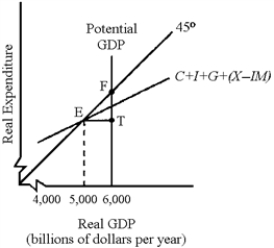Exam 27: Managing Aggregate Demand: Fiscal Policy
Exam 1: What Is Economics254 Questions
Exam 2: The Economony: Myth and Reality184 Questions
Exam 3: The Fundamental Economic Problem: Scarcity and Choice278 Questions
Exam 4: Supply and Demand: an Initial Look297 Questions
Exam 5: Consumer Choice: Individual and Market Demand213 Questions
Exam 6: Demand and Elasticity247 Questions
Exam 7: Production, Inputs, and Cost: Building Blocks for Supply Analysis246 Questions
Exam 8: Output, Price, and Profit: the Importance of Marginal Analysis232 Questions
Exam 9: The Financial Markets and the Economy: the Tail That Wags the Dog225 Questions
Exam 10: The Firm and the Industry Under Perfect Competition219 Questions
Exam 11: The Case for Free Markets: the Price System251 Questions
Exam 12: Monopoly236 Questions
Exam 13: Between Competition and Monopoly248 Questions
Exam 14: Limiting Market Power: Antitrust and Regulation152 Questions
Exam 15: The Shortcomings of Free Markets210 Questions
Exam 16: The Economics of the Environment, and Natural Resources218 Questions
Exam 17: Taxation and Resource Allocation218 Questions
Exam 18: Pricing the Factors of Production230 Questions
Exam 19: Labor and Entrepreneurship: the Human Inputs267 Questions
Exam 20: Poverty, Inequality, and Discrimination167 Questions
Exam 21: An Introduction to Macroeconomics212 Questions
Exam 22: The Goals of Macroeconomic Policy212 Questions
Exam 23: Economic Growth: Theory and Policy226 Questions
Exam 24: Aggregate Demand and the Powerful Consumer216 Questions
Exam 25: Demand-Side Equilibrium: Unemployment or Inflation215 Questions
Exam 26: Bringing in the Supply Side: Unemployment and Inflation228 Questions
Exam 27: Managing Aggregate Demand: Fiscal Policy207 Questions
Exam 28: Money and the Banking System222 Questions
Exam 29: Monetary Policy: Conventional and Unconventional208 Questions
Exam 30: The Financial Crisis and the Great Recession64 Questions
Exam 31: The Debate Over Monetary and Fiscal Policy216 Questions
Exam 32: Budget Deficits in the Short and Long Run214 Questions
Exam 33: The Trade-Off Between Inflation and Unemployment218 Questions
Exam 34: International Trade and Comparative Advantage215 Questions
Exam 35: The International Monetary System: Order or Disorder216 Questions
Exam 36: Exchange Rates and the Macroeconomy215 Questions
Exam 37: Contemporary Issues in the Useconomy23 Questions
Select questions type
In an effort to balance the federal budget, an increase in Social Security taxes is passed.What is the most likely effect of this on equilibrium GDP?
(Multiple Choice)
4.9/5  (44)
(44)
A major complication with fiscal policy to control aggregate demand is the
(Multiple Choice)
4.9/5  (37)
(37)
If the federal government increases the amount of Social Security benefits for retired persons, then the
(Multiple Choice)
4.8/5  (43)
(43)
If the MPC in the United States was high, it would increase the value of the multiplier.
(True/False)
4.8/5  (40)
(40)
You are a member of Congress in 2007-2009 when the economy is in a recessionary gap.If your goal is to achieve full employment, you should vote for
(Multiple Choice)
4.9/5  (27)
(27)
An active stabilization policy designed to limit the size of government would
(Multiple Choice)
4.9/5  (39)
(39)
Ronald Reagan's presidency could be characterized as a period of
(Multiple Choice)
4.8/5  (32)
(32)
Figure 11-1
 -In Figure 11-1, the economy is experiencing a(n)
-In Figure 11-1, the economy is experiencing a(n)
(Multiple Choice)
4.9/5  (34)
(34)
____ is the income actually available to the consumers that determines aggregate demand.
(Multiple Choice)
4.9/5  (31)
(31)
Productivity increases, brought about by increased education and training, may shift the aggregate supply curve outward.
(True/False)
4.9/5  (31)
(31)
Tax cuts associated with supply-side economics often lead to increased
(Multiple Choice)
4.7/5  (33)
(33)
How does the multiplier for a change in government spending compare to the multiplier for a change in taxes?
(Multiple Choice)
4.8/5  (41)
(41)
According to Keynesian theory, a decrease in government expenditures would be a proper fiscal policy during
(Multiple Choice)
4.7/5  (49)
(49)
Showing 41 - 60 of 207
Filters
- Essay(0)
- Multiple Choice(0)
- Short Answer(0)
- True False(0)
- Matching(0)